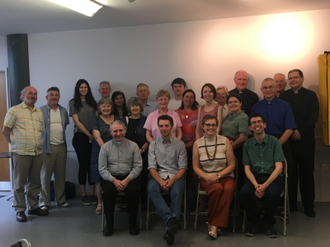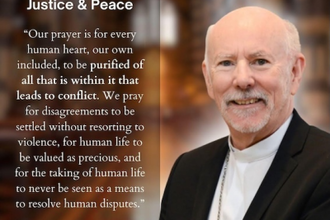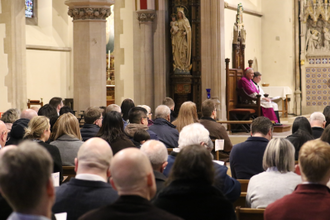Westminster J&P Forum on UN Sustainable Development Goals - 'leave no one behind'

Forum with speakers: Bishop Paul McAleenan, Edward DuQuay, Christine Allen, James Buchanan
Representatives from a dozen parishes attended Westminster Social J&P Forum at St Aloysius' in Euston on Saturday.
The theme of the day, chaired by Bishop Paul McAleenan and Westminster J&P fieldworker Martha Behan, was the UN Sustainable Development Goals. After presentations by Christine Allen, Director of CAFOD, James Buchanan from Operation Noah and Edward De Quay from the Bishops Conference of England and Wales there were discussion groups followed by lunch.
In her wide-ranging talk on the UN Sustainable Development Goals, Christine explained that they are "a collection of goals that set a global framework for aid and development up to 2030. In 2015 they were agreed by global leaders - including David Cameron. "
She said: "They replaced the Millennium Development Goals, .... The MDGs were created through a top-down, closed door process that did not engage people living in poverty. It was very much a "this is what we (the rich) will focus our money on. This meant that the goals often failed to respond to the experiences or priorities of people on the ground. Some progress was made but nowhere near enough, not least because of the lack of community engagement "
"The process of getting to the SDGs was much more consultative with civil society. Working with Christian Aid at that point, I saw how civil society voices were much more engaged. We sought inclusion, tackling inequality and of course sustainability. We were successful in getting some of these principles accepted and adopted within the goals."
Christine continued: "The goals now apply universally - to every country. This means that these should apply to our own government and policies too. It is important to be aware of the principles that underpin the SDGs:
Poverty - tackling poverty, hunger, access to education and work are pretty core.
Inequality - not just about tackling poverty but recognizing the unequal power relationships at the heart of poverty. Gender inequality in particular.
Sustainability and care for creation - 2015 was also the year of the Paris agreement so it's no surprise that these goals include this aspect."
She said: "There is a more holistic approach ... although they are 17 different goals, they are meant to be seen as a more coherent framework and a recognition of how the different bits fit together. Bring together fair economic growth, social inclusion, and environmental protection.
All of this under the strapline - of Leave no one behind. That for me is critical. It's almost theological. The dignity of the human person is at the heart of their vision in the same way as it does in Laudato Si' - the Encyclical of Pope Francis.
They draw attention to some of the biggest environmental challenges in the world today. Sanitation, sustainability, pollution, and climate action are all covered and under each goal is a set of achievable sub-targets. These SDGs highlight the structures behind our society - economic, legal, and political - and their complexities. They aren't just a series of targets."
Christine said: "In many respects it's a great opportunity. I remember in 2015 feeling very excited at the prospect of the goals. From that high watermark in 2015, it feels like we have dropped a long way. So it's great that you are looking at them.
How do we bring the goals into our lives?
It is important to remember that governments are accountable for the delivery of these 17 interlinked goals. They take turns to report on their progress to the UN. This year it's the UK's turn. More about that later.
Something so large and holistic can be challenging. But Laudato Si is too! The most important thing is to break it down into some specific actions - as you have today.
Romero talked about not doing everything, but doing something, and doing it well. That is the issue. Pick a goal, focus. We have picked a few, especially those that resonate with LS.
The important thing is to be alert to the consequences. Some of the failure of the MDGs was its top-down approach. The idea that the donors know best. The engagement of people and communities in the long process of formulating the SDGs meant that there was some form of framework in many countries.
For the UK there is still something of a challenge to do. Perhaps we need to be more pushy in reminding our politicians of the commitments under the SDGs. There are too many people being left behind in our society let alone our world.
There are many businesses and local enterprises especially around local development plans and urban action that are looking to the goals - Liverpool for instance has a committee. You might see it as Agenda 2030 or Global goals rather than SDGs.
How have the goals influenced my work?
For me, my team were heavily involved in supporting communities and looking at what development would look like "Beyond 2015". There probably isn't anything new to people concerned about social justice in the goals. The important thing is that they are a framework that exists. So it's something to appeal to.
When Pope Francis published the encyclical Laudato Si', Caring for our Common Home in June 2015, I felt it was something of a precursor to the goals as well as the Paris Climate negotiations. The letter was a timely reminder to us all that we're all inter-connected and our actions across the world have a profound effect on the lives of the most vulnerable people. As Catholics if we read and act on LS, then we are putting the goals into practice!
CAFOD, through the global Caritas family of 165 organisations Caritas is pressing hard for the necessary action to be taken at national, regional and global levels to bring about the real change the SDGs represent. Caritas in its role at the UN is influencing there, but most importantly the local Caritas organisations have to engage locally.
For the global Caritas, it is looking to hold both extractive industries and national governments to account, calling for fair and responsible policies and deeds. It campaigns at high level meetings and events worldwide to bring economic and social justice to the poor.
Within this framework, then as CAFOD we focus on some specific areas such as climate change, decent work and extractive industries, business and human rights as well as tackling poverty, inequality and voice for people Throughout all our programming work, we seek to do it in a way that cares for our common home. Hearing the cry of the earth as well as the cry of the poor. Perhaps we are not vocal enough about the goals. They are a framework.
Why should we work towards them? They exist.
Remember its governments that need to act on these - we need to push governments. We should hold governments to account for their actions.
The SDGs link social, economic and environmental development. But the challenges are great - a growing population, an increase in natural disasters, the impact of environmental degradation and climate change. There is a massive political challenge too. The goals do seem to have lost traction somewhat.
Even the UK's report isn't that brilliant.
•Yet to set out a vision and a plan for how the UK will meaningfully contribute to the success of the goals by 2030. It's a bit of a mapping exercise rather than an ambitious agenda.
•There is to some extent a stronger engagement in Wales and Scotland, through the devolved governments.
•But overall it lacks understanding of the intersecting factors that cause marginalization and folk being left behind. Ironic given that the UK was a real champion in this area.
We know the UN will be pushing the government for answers at the High Leve Political Forum later this month.
It just goes to show the different and challenging political environment we are in.
As a tactic at CAFOD we have been focusing on specific pieces of work and that might be a helpful tactic for you!
However, I do keep banging on about the goals and reminding governments of their responsibility here at home and not just overseas. This will get even more important as we hurtle into a new PM, potentially a new government, and potentially a general election.
I've linked the SDGs with Laudato Si (LS) a fair amount, and I think for us as people of faith, that is an important thing. LS as a papal encyclical is an important contribution to the canon of church teaching, but it also offers a strong spiritual reflection. Some of you (especially priests!) may want to start with chapter six - on ecological education and spirituality. Its basically about a conversion and about love.
I think that's at the heart of the SDGs - they are a framework of course, if we want to leave no one behind, like the good shepherd with his sheep, then we need to find that conversion to a new heart, a new life and a new way of being."
In his talk, Edward De Quay from the Bishops Conference, spoke about what the Church is already doing to implement the SDGs. Since Laudato Si, he mentioned that Pope Francis has had a number of meetings and discussions with the extractive industries, in particular the oil companies.
James Buchanan from Operation Noah, went on to focus on divestment, mentioning dozens of Church organisations and religious orders that have already divested from fossil fuels - including the Jesuits in Ireland, the Passionists, Irish Catholic Bishops Conference, Caritas Internationalis, the Quakers, Lutherans and United Reform Church.
After the talks there were roundtable discussions in which each group looked at how they could implement the Sustainable Development Goals at parish level - followed by lunch.
This was the second meeting of the Westminster Social J&P Forum. The next one will be on 12 October. Details to follow soon.
For more information see: https://westminsterjp.wordpress.com


















